Greta visits the garden of Maude Farrugia and Neil Erenstrom
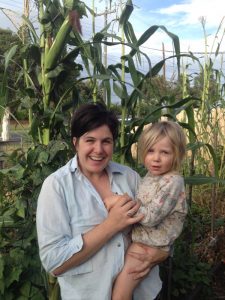 Greta, together with neighbour Stevie, has visited the garden of Maude Farrugia and Neil Erenstrom, from Heidelberg Heights. Here is how the write up starts: “The ‘Farrugia-Erenstroms’ are a little family that live in a little house on top of a big hill in Heidelberg Heights. Maude works part-time from home for Pip Permaculture magazine, so gardening feels like ‘real’ work a lot of the time. She also runs her tiny design label Cheerio Paper Co. The rest of her time is spent gardening, looking after 3-year-old Alfie, and being an active member of the local transition towns community. Neil works a lot more (though he’s working on making it a lot less) in solar power research and development. He facilitates Maude’s garden designs through sheer brawn (and general fear of Maude?!). Alfie helps out in the garden by eating much of the produce (before it’s even made it inside), sowing seeds and harvesting. You’ll be surprised to find out that this garden has built up its thriving harvest in just under a year!” Read the full write up.
Greta, together with neighbour Stevie, has visited the garden of Maude Farrugia and Neil Erenstrom, from Heidelberg Heights. Here is how the write up starts: “The ‘Farrugia-Erenstroms’ are a little family that live in a little house on top of a big hill in Heidelberg Heights. Maude works part-time from home for Pip Permaculture magazine, so gardening feels like ‘real’ work a lot of the time. She also runs her tiny design label Cheerio Paper Co. The rest of her time is spent gardening, looking after 3-year-old Alfie, and being an active member of the local transition towns community. Neil works a lot more (though he’s working on making it a lot less) in solar power research and development. He facilitates Maude’s garden designs through sheer brawn (and general fear of Maude?!). Alfie helps out in the garden by eating much of the produce (before it’s even made it inside), sowing seeds and harvesting. You’ll be surprised to find out that this garden has built up its thriving harvest in just under a year!” Read the full write up.
Maude is one of seven Pip magazine’s people listed on their website, with newsletter readers Adrian O’Hagan and Samantha Allemann being two of the others. She blogs on the website around once a week, with her latest blog post being about summer pickling ideas.
Tip of the week – white cabbage moth
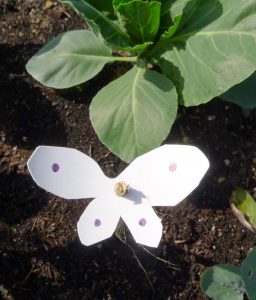 Last week, we talked about March and April as the best months for planting brassicas. Here is what Leaf, Root & Fruit had to say on the subject in their March newsletter: “Just be aware that the dreaded white cabbage moth tends to ruin any unprotected early crops. So plan ahead and have some insect netting ready to protect them. Or better still, just wait until late April to plant out seedlings. The white cabbage is a lot less prevalent in the cooler weather and your young seedlings will stand a better chance of surviving.”
Last week, we talked about March and April as the best months for planting brassicas. Here is what Leaf, Root & Fruit had to say on the subject in their March newsletter: “Just be aware that the dreaded white cabbage moth tends to ruin any unprotected early crops. So plan ahead and have some insect netting ready to protect them. Or better still, just wait until late April to plant out seedlings. The white cabbage is a lot less prevalent in the cooler weather and your young seedlings will stand a better chance of surviving.”
What happens is that the moths lay their eggs on the seedlings and the caterpillars hatch and eat the seedlings. Fine netting stops the moths from reaching the plants to lay their eggs. Another alternative is decoys: white bits of moth-shaped paper on sticks apparently make the moths think that the leaves are already home to caterpillars and thus they leave them alone.
Mac is having a well-earned week off.
Strategies for lead contaminated garden soils
A recent RMIT study found that some Melbourne veggie patches have high levels of lead contamination in the soil. In response, Adam Grubb, from Very Edible Gardens, has written an article giving 11 mitigation strategies. In summary:
- Get tested (by The VegeSafe project at Macquarie University).
- Wash. Wash your hands, and wash your vegetables.
- Add organic matter.
- Home test your soil’s pH.
- Add a high-phosphorous fertiliser.
- Mulch.
- Grow fruit crops, not root crops.
- If you have chickens, keep them separate from the soil.
- Use raised beds. Ideally wicking beds.
- Isolate or remove any highly contaminated soil.
- Eat a healthy diet.
Do you have a Jora compost tumbler?
As part of a research project, 3000acres would like to see a Jora compost tumbler in action. Do you have one that you could show them? If so, email Merrin Layden.
News about local food producers
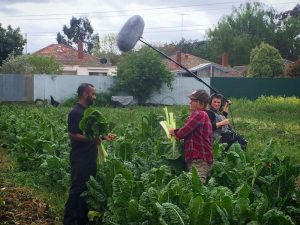 Tamil Feasts, who are based in Brunswick East and grow much of their food at Joe’s Market Garden, featured on the 9th February episode of Gardening Australia. In total, they are on for 12 minutes of the 60-minute program but, irritatingly, this is split across four segments (starting at the 1 minute, 32 minute, 45 minute and 55 minute marks).
Tamil Feasts, who are based in Brunswick East and grow much of their food at Joe’s Market Garden, featured on the 9th February episode of Gardening Australia. In total, they are on for 12 minutes of the 60-minute program but, irritatingly, this is split across four segments (starting at the 1 minute, 32 minute, 45 minute and 55 minute marks).
‘Crowd harvest’ – tomatoes for Easter
At this time of year, gardeners everywhere often have more tomatoes than they can sensibly consume. Gardeners with excess tomatoes are invited to give them to one of the not-for profit organisations listed below, each of will preserve the tomatoes as passata, chutney or sundried and then distribute through their food relief programs. DIVRS in Preston or STREAT in Collingwood. Any questions, contact Cath Lyons (aka Tiny Trowel) by phone (0401 814679) or email.
Naturally died easter eggs
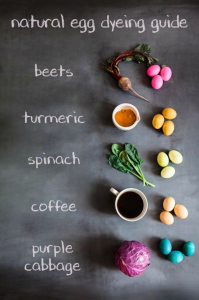 Question: what do you use to die eggs blue for Easter? Answer: purple cabbage, of course.
Question: what do you use to die eggs blue for Easter? Answer: purple cabbage, of course.
Which link was clicked most times in the last newsletter?
Judy’s interview with Carol and Alan Woolcock.
Joke of the week
Why did the fungus leave the party? Because there wasn’t mushroom.
New events
Passata demonstration with Jean Garita
What: Jean Garita, matriarch of Joe’s Market Garden, will talk about how to make passata the traditional way of the Garita family.
When: Saturday, 10th March, 10.30-11.30am.
Where: Joe’s Market Garden, Coburg.
Cost: donation.
Bookings: by email.
Further information: LFC calendar entry.
Vegan day out in Melbourne
What: Local cafes and businesses in Fitzroy will be reducing prices, giving away samples and putting special vegan products on the menu. Here is how it will works: a map of all the participating businesses will be created. Collect your map and vouchers from the Cruelty Free Shop. Then enjoy spending the weekend walking around redeeming the vouchers. At the Cruelty Free Shop, they will have storewide discounts on hundreds of items and special offers plus free food tastings all weekend long.
When: Saturday, 10th March, 9am-6pm and Sunday, 11th March, 10am-5pm.
Where: Fitzroy.
Cost: free.
Bookings: just turn up.
Further information: LFC calendar entry.
Getting ready for seasonal veggies and sowing from seed
What: Led by Maria Ciavarella.
When: Wednesday, 14th March, 1-3pm.
Where: Doncaster.
Cost: $30.
Further information: LFC calendar entry.
Intro to composting workshop
What: Go and learn how to make beautiful, rich, compost for your garden. Turn household green waste into nutritious food for your veggies. Learn about the theory and different compost systems: hot compost, bokaski and worm farms. Facilitated by Murundaka Cohousing Community members Kaz Phillips and Mikoto Araki.
When: Saturday, 17th March, 10am-midday.
Where: Murundaka, Heidelberg Heights.
Cost: $5.
Bookings: EventBrite.
Further information: LFC calendar entry.
Great soil, making compost and keeping a worm farm
What: Led by Maria Ciavarella.
When: Wednesday, 21st March, 1-3pm.
Where: Doncaster.
Cost: $30.
Further information: LFC calendar entry.
Easter treats with The Kitchen Whizz
What: Min and Thea from The Kitchen Whizz will demonstrate a variety of healthy sweet treats just in time for Easter. Recipes will include choc chip hot cross buns, sweet potato brownie, cashew chilli coconut chocolate bark, and Easter bliss balls.
When: Friday, 23rd March, 11am-midday.
Where: Camberwell.
Cost: $57.
Bookings: EventBrite.
Further information: LFC calendar entry.
Kitchen dream team
What: Manage your home kitchen just like a chef. Learn to work as a team in your kitchen at home. You will learn tips that will support you to work together and involve the kids, to put home cooking at the centre of your family’s life. An interactive workshop with practical activities that you can go home and start putting into practice straight away. Please note: no actual cooking involved – this is a theory-based program.
When: Saturday, 24th March, 11am-midday.
Where: Lilydale Library.
Cost: free.
Bookings: their website.
Further information: LFC calendar entry.
Hibi Farm home tour
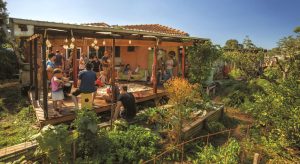 What: The Hibi Farm is a micro suburban farm that produces bread, beer, cheese, chocolate, honey, preserves, pottery and bicycles from scratch, amid thriving fruit and vegetable gardens. It is a social experiment in sustainable living, and the hub of a spontaneous community known as ‘the hood’.
What: The Hibi Farm is a micro suburban farm that produces bread, beer, cheese, chocolate, honey, preserves, pottery and bicycles from scratch, amid thriving fruit and vegetable gardens. It is a social experiment in sustainable living, and the hub of a spontaneous community known as ‘the hood’.
When: Sunday, 25th March, 9am-midday.
Where: Heidelberg West.
Cost: $25.
Bookings: TryBooking.
Further information: LFC calendar entry.
Safer pest control
What: Led by Maria Ciavarella.
When: Wednesday, 28th March, 1-3pm.
Where: Doncaster.
Cost: $30.
Further information: LFC calendar entry.
Introduction to natural beekeeping (two-day)
What: Suitable for beginners, and ideal for the backyarder, this two-day event is designed to provide participants with the information they need to start natural beekeeping with confidence. It will cover such subjects as: boxes, equipment, legislation, choosing the location, ongoing maintenance and harvesting. It will also include hive manipulations and some honey tasting. After the course, for those that need it, the course organisers may be able to provide bees for your hive at no cost during swarming season. The event is being run by the Natural Beekeeping Group of Permaculture Victoria.
When: Saturday, 7th April and Sunday 8th April, both 10am-5pm.
Where: Mitcham.
Cost: $200 for members of Permaculture Victoria; $250 for non-members.
Bookings: by email.
Further information: LFC calendar entry.
Young gardeners
What: Join your youngsters in learning to successfully grow your own food. Children enjoy eating food they have produced.
When: Saturday, 21st April, 10am-midday.
Where: Macleod.
Cost: $30 (children free).
Bookings: by phone (0408 733683 or 9444 7427).
Further information: LFC calendar entry.
Summary of upcoming events
Over the next week
- Sensational sourdough at home: Wednesday, 7th March, 11am-3pm.
- Advanced sourdough at home: Thursday, 8th March, 11am-3pm.
- Plant-based midweek cooking class: Thursday, 8th March, 6.30-8.30pm.
- Growing veggies is easier than you think: Thursday, 8th March, 6.30-9pm.
- Pasta making: Thursday, 8th March, 7-8pm.
- Yoghurt masterclass: Thursday, 8th March, 8.30-9.30pm.
- Cooking master class: Friday, 9th March, 7-9pm.
- Vegan day out in Melbourne: Saturday, 10th March, 9am-6pm.
- How to protect your produce from birds and animals: Saturday, 10th March, 10-10.30am.
- Celebrate harvest month (Garden of Plenty garden tour): Saturday, 10th March, 10-11am.
- Passata demonstration with Jean Garita: Saturday, 10th March, 10.30-11.30am.
- 3 Ravens Brewery tour and tasting: Saturday, 10th March, 4-5pm.
- Guy and Susan’s garden: Sunday, 11th March, 10-11am.
- Companion planting: Sunday, 11th March, 10am-midday.
- Vegan day out in Melbourne: Sunday, 11th March, 10am-5pm.
- Guy and Susan’s garden: Sunday, 11th March, 1-2pm.
- Cheese making class and kefir tips: Tuesday, 13th March, 7-9pm.
- Getting ready for seasonal veggies and sowing from seed: Wednesday, 14th March, 1-3pm.
Over the next month
- Cultural Diversity Week cooking demo: Thursday, 15th March, 1-3pm.
- Healthy productive compost and worms: Thursday, 15th March, 6.30-9pm.
- Reclaiming wellness, vitality and happiness – why gut health is so important: Friday, 16th March, 1.30-2.30pm.
- Summer fruit tree maintenance: Saturday, 17th March, 9.30am-12.30pm.
- Asian flavours and recipes re-imagined: Saturday, 17th March, 10-10.45am.
- Become a junior chocolatier: Saturday, 17th March, 10-10.45am.
- Intro to composting workshop: Saturday, 17th March, 10am-midday.
- Nuka duke – rice bran pickling: Saturday, 17th March, 10am-midday.
- The Herb and Chilli Festival: Saturday, 17th March, 10am-5pm.
- Food forest gardening: Saturday, 17th March, 10.30-11.30am.
- Asian flavours and recipes re-imagined: Saturday, 17th March, 11.30am-12.15pm.
- Chocolate discovery class: Saturday, 17th March, 11.30am-12.30pm.
- Asian flavours and recipes re-imagined: Saturday, 17th March, 1-1.45pm.
- Create a unique beer for Burnley: Saturday, 17th March, starting 1pm.
- Thrive Community Garden tour: Saturday, 17th March, 2-3pm.
- Nuka duke – rice bran pickling: Saturday, 17th March, 2-4pm.
- The Herb and Chilli Festival: Sunday, 18th March, 10am-5pm.
- Whittlesea Community Festival: Sunday, 18th March, 10am-5pm.
- Asian flavours and recipes re-imagined: Sunday, 18th March, 11-11.45am.
- Asian flavours and recipes re-imagined: Sunday, 18th March, 12.30-1.15pm.
- Asian flavours and recipes re-imagined: Sunday, 18th March, 2-2.45pm.
- Michelin Stars: Tales from the Kitchen – Australian premiere (film): Sunday, 18th March, 4-6pm.
- Heritage apple tasting: Sunday, 18th March, 5-7pm.
- Vietnamese cooking and costume show: Monday, 19th March, 10.30-11.30am.
- Healthy meals in minutes: Monday, 19th March, midday-1pm.
- Planting for a changing climate: Monday, 19th March, 1-3pm.
- Healthy lunchbox and quick dinner ideas: Tuesday, 20th March, 9.30-11.40am.
- Nuka duke – rice bran pickling: Tuesday, 20th March, 10am-midday.
- Italian olive preserving demonstration: Tuesday, 20th March, 10.30-11.30am.
- Japanese tea workshop: Tuesday, 20th March, 2-3pm.
- Nuka duke – rice bran pickling: Tuesday, 20th March, 2-4pm.
- Plant-based midweek cooking class: Tuesday, 20th March, 6.30-8.30pm.
- Great soil, making compost and keeping a worm farm: Wednesday, 21st March, 1-3pm.
- International street foods: Wednesday, 21st March, 3-4pm.
- Eltham twilight market: Thursday, 22nd March, 4-8pm.
- Fruit trees in small spaces using espalier techniques: Thursday, 22nd March, 6.30-8pm.
- Preparing for the Winter harvest: Thursday, 22nd March, 6.30-9pm.
- ‘Aussie Street’ – with David Holmgren (co-originator of permaculture): Thursday, 22nd March, 7-9pm.
- Fermentations and preserves masterclass: Thursday, 22nd March, 8.30-9.30pm.
- Easter treats with The Kitchen Whizz: Friday, 23rd March, 11am-midday.
- Summer preserves: Saturday, 24th March, 9.30am-12.30pm.
- Gardening 101: Saturday, 24th March, 10am-midday.
- Sourdough bread making workshop: Saturday, 24th March, 10am-1pm.
- HarvEast: Saturday, 24th March, 10am-8pm.
- Kitchen dream team: Saturday, 24th March, 11am-midday.
- Propagating Autumn Asian greens: Saturday, 24th March, 11am-midday.
- Improve your gut health: Saturday, 24th March, 1-3pm.
- Create a unique beer for Burnley: Saturday, 24th March, starting 1pm.
- Keeping backyard chooks: Saturday, 24th March, 2-3pm.
- Home composting workshop: Saturday, 24th March, 2-4.30pm.
- Watsonia Library Community Garden tour: Saturday, 24th March, 3-4pm.
- Hibi Farm home tour: Sunday, 25th March, 9am-midday.
- HarvEast: Sunday, 25th March, 10am-8pm.
- Healthy lives plant-based cooking: Sunday, 25th March, midday-4pm.
- On The Bend / On The Mend – Coffee and Beer Festival: Sunday, 25th March, midday-5pm.
- Easter chocolate novelties workshop: Monday, 26th March, 10.30am-midday.
- Miso cooking: Tuesday, 27th March, 10am-12.30pm.
- Tea and mindfulness: Tuesday, 27th March, 2-3pm.
- Miso cooking: Tuesday, 27th March, 2-4.30pm.
- Maltese cooking: Wednesday, 28th March, 10.15am-12.15pm.
- Safer pest control: Wednesday, 28th March, 1-3pm.
- Root to tip cooking: Wednesday, 28th March, 7-9pm.
- Thrifty gardening: Thursday, 5th April, 6.30-9pm.
- Backyard chooks for beginners: Friday, 6th April, 10am-midday.
- For young people – traditional Italian cooking: Friday, 6th April, 10am-midday.
- Home brewing with Paul Rigby: Saturday, 7th April, 10am-3pm.
- Introduction to natural beekeeping (two-day): Saturday, 7th April and Sunday 8th April, both 10am-5pm.
